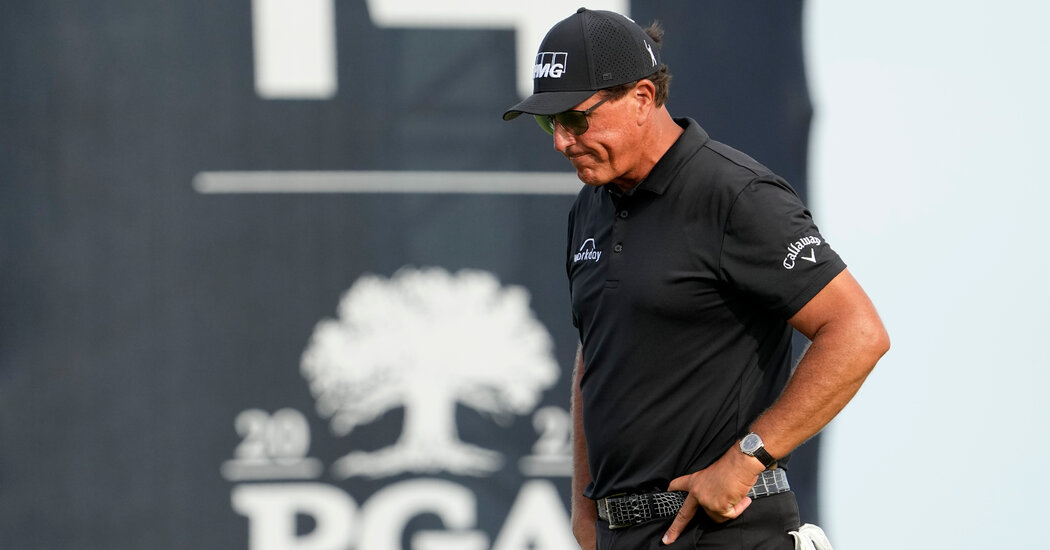
The PGA Tour has sternly refused to grant its membership the ability to play in the inaugural event of a rival Saudi-backed golf tour, which will make its debut next month outside London. The move, announced in a memo to tour members Tuesday night, was hardly a surprise — the PGA Tour is protecting its business — but in the most gentlemanly of sports, it exposed uncharacteristic rancor.
It is also pressuring the world’s best men’s golfers, who are highly paid entrepreneurs, to choose sides over where they will collect their millions of dollars in compensation. And not inconsequentially, the focus of the dispute is often the source of the alternative golf circuit, LIV Golf, whose major shareholder is the Public Investment Fund, the sovereign wealth fund of Saudi Arabia.
The overwhelming likelihood is that only a small number of players with little standing on the established, American-based PGA Tour — plus a handful of golfers past their prime — will jump to the new golf series, which may not lack for money but currently lacks prestige, or even a TV contract.
But if the start-up tour perseveres for years — also not a certainty — and keeps its promise to dole out purses that overshadow those on the PGA Tour, it could sow unrest down the line in a future generation of young pros, especially those raised outside the United States whose focus is not so centered on the PGA Tour.
For now, scores of tour players, including everyone at the top of the men’s world rankings, have pledged their fealty to the PGA Tour.
Several times, Rory McIlroy, a four-time major winner who is ranked seventh in the world, has declared the breakaway tour “dead in the water.” He has also disapproved of its underpinnings, saying, “I didn’t like where the money was coming from.” Aligning with McIlroy, 33, have been some dominant new faces of the game, like Jon Rahm, Collin Morikawa, Justin Thomas and Jordan Spieth.
Caught in the dispute is one of the most renowned players in the sport, Phil Mickelson, who has stepped away from competitive golf for months since making comments in support of the breakaway league.
Mickelson was one of several PGA Tour-affiliated players, including Sergio García of Spain and Lee Westwood of England, who applied for a release from the tour to play in the first event of a LIV Golf International Series at the Centurion Club near London from June 9 to 11.
The tour is declining to grant those releases, which means players who choose to play in the LIV Golf event will be deemed in violation of tour regulations. Disciplinary action could include suspension or revocation of tour membership.
Jay Monahan, the PGA Tour commissioner, has made it plain to the players this year that the tour will suspend players who defect to the rival league. The same may be true for a player who wants to play even one tournament on the LIV Golf schedule, which includes eight events from June to October, including one in Thailand and five in the United States. In late July, the host site will be Trump National Golf Club in Bedminster, N.J.
Hours after the PGA Tour declined the players’ requests to play at the Centurion Club event, Greg Norman, a former major golf champion who is the chief executive of LIV Golf Investments, denounced the tour’s decision.
“Sadly, the PGA Tour seems intent on denying professional golfers their right to play golf, unless it’s exclusively in a PGA Tour tournament,” Norman said. He added: “Instead, the tour is intent on perpetuating its illegal monopoly of what should be a free and open market. The tour’s action is anti-golfer, anti-fan and anti-competitive.”
As if to up the ante, LIV Golf on Tuesday announced plans for more events from 2023 to 2025.
The next step in the clash may be in court. Monahan has insisted that the tour’s lawyers believe its decision making will withstand legal scrutiny.
While a court case will be less than riveting, the more compelling drama within the drama for golf will be Mickelson’s situation. He has only a few days to commit to playing in next week’s P.G.A. Championship, which he won last year when he became the oldest major champion at age 50. Mickelson has been linked to the LIV Golf circuit for months. In February, he was severely rebuked for incendiary comments attributed to him in support of the Saudi-backed tour.
In an interview for a biography to be released next week, Mickelson told the journalist Alan Shipnuck that he knew of the kingdom’s “horrible record on human rights,” but that he was willing to help the new league because it was a “once-in-a-lifetime opportunity” to drastically increase the income of PGA Tour players.
Shortly afterward, Mickelson, a six-time major winner who has earned nearly $95 million on the PGA Tour, was dropped by several of his corporate sponsors. He apologized and called his remarks “reckless.”
Next week, perhaps while Mickelson is making final preparations for his return to competitive golf at the P.G.A. Championship, Shipnuck’s book, “Phil: The Rip-Roaring (and Unauthorized!) Biography of Golf’s Most Colorful Superstar,” will be released. It is expected to shed light on Mickelson’s gambling habits, among other things.
García, another player who has long been considered a candidate to join the LIV Golf enterprise, recently expressed his support of the alternative tour in an unconventional way. Playing in last week’s PGA Tour event near Washington, García was apprised by a golf official of an on-course ruling that went against him. That decision was later determined to be erroneous (but not reversed). García, whose career PGA Tour earnings exceed $54 million, told the official, in a reaction picked up by a nearby television broadcast microphone: “I can’t wait to leave this tour.” He continued: “A couple of more weeks, I don’t have to deal with you anymore.”
García, 42, represents the kind of professional golfer who might be most receptive to the promises of the LIV Golf enterprise. A Masters champion with 11 PGA Tour victories, he has been struggling to keep up with the more powerful, long-hitting young players taking over golf. His world ranking has slipped to 46th. He is also not American, like other golfers who are reported to have signed on with the breakaway tour. These players are most likely attracted to LIV Golf’s more global, and limited, schedule. Some players view the American tour as overbearing, restrictive and weighted toward events staged in the United States.
In the meantime, there is a ruckus in the genteel world of golf. Its short-term impact is unlikely to rock the boat much. The question will be how long the rival tour can maintain sustainability, and whether that will be enough to seriously churn the sport’s customarily calm and lucrative waters.




